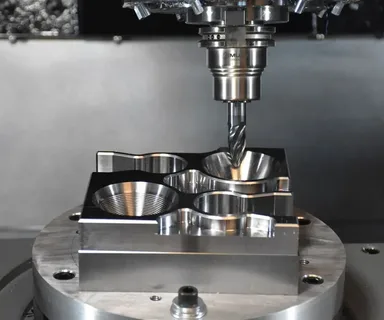While CNC machining receives recognition for exceptional prototyping capabilities, its true power extends far beyond initial development phases. This manufacturing process plays a critical role in full-scale, end-use production across numerous industries, delivering precision and reliability that modern applications demand.
The Unmatched Precision of CNC Machining
CNC machining achieves extraordinary accuracy through computer-controlled subtractive manufacturing processes. This technology maintains incredibly tight tolerances while producing parts with exceptional surface finishes directly from raw material. The precision inherent in CNC machining stems from computer-guided toolpaths that eliminate human error and ensure consistent repeatability across thousands of identical components.
Material Versatility in CNC Machining Applications
The vast range of materials compatible with CNC machining makes it suitable for demanding applications across diverse industries. From engineering plastics and aluminum alloys to high-strength materials like titanium and Inconel, CNC machining accommodates parts that must withstand extreme stress, elevated temperatures, and corrosive environments. This material flexibility positions CNC machining as the preferred choice for critical applications requiring specific material properties.
CNC Machining for High-Volume Production Excellence
Contrary to common misconceptions, CNC machining excels in high-volume production scenarios. Automated machining centers equipped with pallet changers operate continuously, producing thousands of identical, high-precision parts with minimal human intervention. Modern CNC machining facilities run 24/7 operations, maximizing efficiency while maintaining the strict quality standards essential for production applications.
Industries That Rely on Precision CNC Machining
Aerospace manufacturers depend on CNC machining for flight-critical components where failure represents catastrophic risk. Medical device producers utilize CNC machining for surgical instruments and implants requiring biocompatibility and dimensional precision. Automotive engineers rely on CNC machining for engine components and transmission parts that endure extreme operating conditions throughout vehicle lifecycles.
Comparing CNC Machining to Alternative Production Methods
CNC machining offers distinct advantages over processes like die casting when considering lower production volumes or applications where mold costs become prohibitive. While injection molding suits ultra-high volume requirements, CNC machining provides superior flexibility for medium-volume production runs while maintaining exceptional part quality and dimensional accuracy.
CNC Machining as a Production Powerhouse
CNC machining represents a cornerstone of modern manufacturing, providing the reliability, precision, and material strength required for final products that perform reliably in real-world applications. This proven technology continues delivering the manufacturing excellence that industries worldwide depend upon for their most critical components and assemblies.



